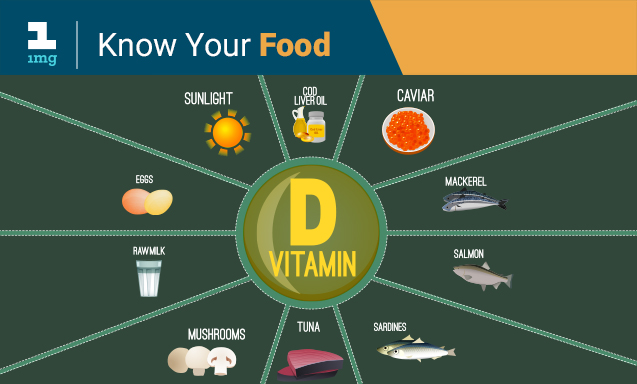
Did you know that vitamins are not produced in the body? Yes. That is why vitamins must come from your diet. However, Vitamin D is an exception. Here’s more on what you need to know about sun exposure and Vitamin D, the foods rich in Vitamin D and why you may need supplements.
Why do you need Vitamin D?
Vitamin D is a fat-soluble vitamin which is stored along with cholesterol. So to produce Vitamin D in the body the sun rays should reach deep in the skin. The vitamin is needed for calcium absorption in the gut to maintain adequate levels of calcium and phosphate for bone growth and bone mineral density.
Recommended daily allowance or RDA of Vitamin D
According to the Indian Council of Medical Research (ICMR), the RDA of Vitamin D for Indians under minimal exposure to sunlight is:
1 – 50 years: 5 micrograms (200 IU)
51 years and above: 10 micrograms (400 IU)
Pregnancy and Lactating mothers: 5 micrograms (200 IU)
Sun exposure and Vitamin D
The production of Vitamin D in the body is dependent on how much sunlight reaches the skin. The factors that affect sun exposure and Vitamin D production include:
– Where you live: The farther you live from the Equator, the lesser the intensity of sun rays.
– The season: Sun exposure is higher in summers than in winters.
– Time of the day: The best time is 11 am – 3 pm.
– Age: The older you get, the lower the production.
– Skin color: The darker the skin colour, the longer the exposure.
– Exposed skin: Around 70% of the body should be exposed to sunlight.
– Sunscreen: More the use of sunscreen, lesser is the exposure.
– Pollution: Higher the level of pollution, fewer rays reach the earth.
Common food sources of Vitamin D
Practically speaking, getting enough Vitamin D through dietary sources is difficult. Certain types of fish and foods fortified with Vitamin D are the major sources. Here’s a list of foods that contain Vitamin D:
85 gms of cooked salmon = 444 IU
85 gms of cooked tuna fish = 229 IU
85 gms of cooked sardines = 165 IU
240 ml of fortified milk = 116 IU
240 ml of fortified orange juice = 100 IU
1 whole cooked, scrambled egg = 44 IU
30 gms of cheddar cheese = 7 IU
100 gms of white button mushrooms = 7 IU
As you can see, certain foods like fortified milk or juices are not readily available in India and you will need to eat a large amount of Vitamin D rich foods meet your daily requirement through diet.
Why do you need supplements?
According to a study in Indian Journal of Pharmaceutical Science[1], Vitamin D deficiency is prevalent in 70 to100% in the Indian population. This is due to lack of sufficient exposure to the sun and the inability to meet the daily needs through diet.
For the Indian skin tone, the minimum “direct sun exposure” required daily is more than 45 min to bare face, arms and legs to the sun’s UV rays. Most Indians do not get adequate sun exposure due to the fact that we wear clothes that cover our body and rarely if ever go sunbathing in swimwear.
Secondly, most dietary sources of Vitamin D have very low Vitamin D content. The Vitamin D content of unfortified milk is very low (2 IU/100 mL). To get your daily dose of Vitamin D, you need to drink more than half a litre of fortified milk and around 10 litres of unfortified milk every day.
Vitamin D supplements available in the form of capsules, tablets, injections, granules and powders are often prescribed to those diagnosed with a deficiency. But, signs of Vitamin D deficiency are usually ignored and it remains largely undiagnosed.
A daily intake of Vitamin D supplements to meet the daily recommended dose of the vitamin is not a bad idea. But an excess of Vitamin D can be harmful (the upper limit is 4000 IU per day), so consult your doctor before taking these supplements.
(With inputs from Dr. Swati Dave, Dietician and nutritionist, Ahmedabad)
Recommended Reads:
Feel Tiredness, Weakness Or Joint Pains? It Could Be Vitamin D Deficiency
Vitamin D: The Right Way To Take It
References:
Lhamo Y, Chugh PK, Tripathi CD. Vitamin D Supplements in the Indian Market. Indian J Pharm Sci. 2016 Jan-Feb;78(1):41-7.
G R, Gupta A. Vitamin D deficiency in India: prevalence, causalities and interventions. Nutrients. 2014 Feb 21;6(2):729-75.